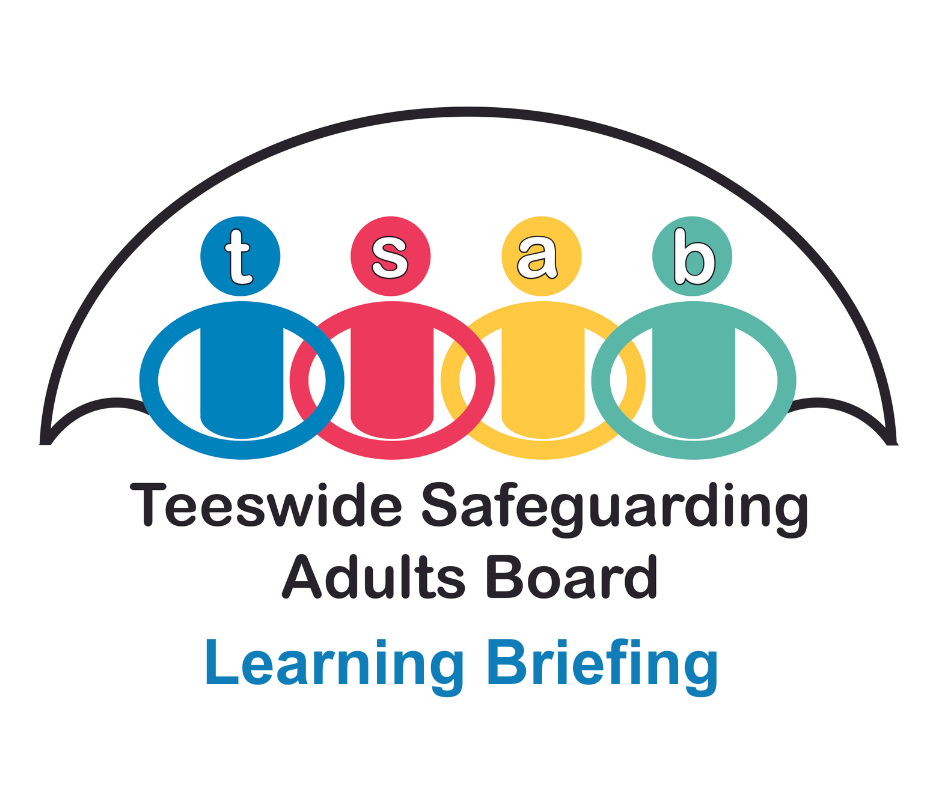
1. Professional Challenge
There are many Safeguarding Adult Reviews, including those carried out by the Teeswide Safeguarding Adults Board, where practitioners involved in raising safeguarding concerns miss opportunities to challenge practice. This can be due in part to staff not being fully aware of the safeguarding adults policies and procedures that are in place to support them, and/or the safeguarding arrangements that could or should have been put in place.
This briefing provides professionals with information and guidance on how to use TSAB’s Professional Challenge procedures if there are questions raised which are not resolved.
2. Why Professional Challenge?
- It promotes a learning culture.
- It promotes positive, professional and good practice.
- It creates open and transparent multi-agency working.
- It promotes good outcomes for adults at risk of or experiencing abuse.
3. Examples of Types of Dispute
- Response to a safeguarding concern.
- Roles and responsibilities.
- Mental Capacity issues.
- Decision-making.
- Service provision.
- Information sharing and communication.
4. Stages of the Professional Challenge Process
Stage 1: Professional to professional discussion
Any practitioner who is unhappy with a decision, action or inaction of another professional or agency should contact the person or agency who made the decision and express their views and attempt to resolve the issue
Stage 2: Escalate to Line Manager/ Safeguarding Lead
If the dispute is not resolved at Stage 1, both parties should alert their line managers to the issues of the dispute. The line manager of the person raising the dispute should review the concerns and if they feel they are justifiable, raise these with the line manager for the professional receiving the challenge and convene a meeting to discuss and attempt resolution.
Stage 3: Escalate to Senior Managers
If the dispute is not resolved at Stage 2, the line managers of both agencies should escalate to senior management to attempt resolution
Stage 4: Escalate to Teeswide Safeguarding Adults Board
If a resolution is not agreed at Stage 3, the issue should be raised with the agency’s TSAB representative for discussion at the next Board meeting. TSAB will make the final decision on the next course of action.
It would be unusual for the dispute to reach this stage and for this reason, the TSAB should consider whether there are wider lessons to be learned. TSAB will consider the issues, identify any learning and make recommendations, where appropriate. Should specific learning not be identified and the dispute remains unresolved, TSAB may wish to convene a resolution meeting.
NB The outcome of the challenge should be shared with the referrer at each stage of the process so that they can be assured that their concerns have been escalated.
For more information please refer to TSAB’s Professional Challenge procedure.
5. Making Safeguarding Personal
Decisions made within adult safeguarding may be challenged by practitioners from within and between agencies. Whilst this is understandable and generally acceptable, it is vital that such differences do not affect the outcomes for adults with care and support needs.
It is important to:
- Ensure professional disputes do not put adults at risk or obscure the focus on the adult
- Ensure professional disputes between agencies are resolved in a timely, open and constructive manner
- Identify problem areas in working together where there is a lack of clarity and to promote resolution via amendment to protocols and procedures
The safety of the adult is the paramount consideration in any professional disagreement and any unresolved issues should be escalated with due consideration to the risks that might exist for the adult.
6. Getting Support
- Recognise it may be difficult to challenge other professionals.
- Be kind to yourself and look after your own well-being.
- Use the support available to you: supervision, management support, peer support.
- Be familiar with policies and procedures.
7. Additional Resources and Training Materials
Please take a look at:
- TSAB Professional Challenge procedure
- TSAB Policies and Procedures
- TSAB Safeguarding Adult Review reports for additional learning from reviews:
Version Number 1
Date approved: October 2024